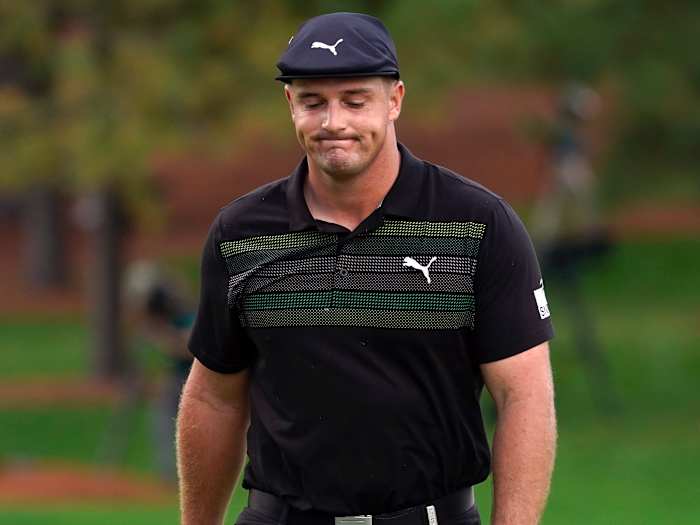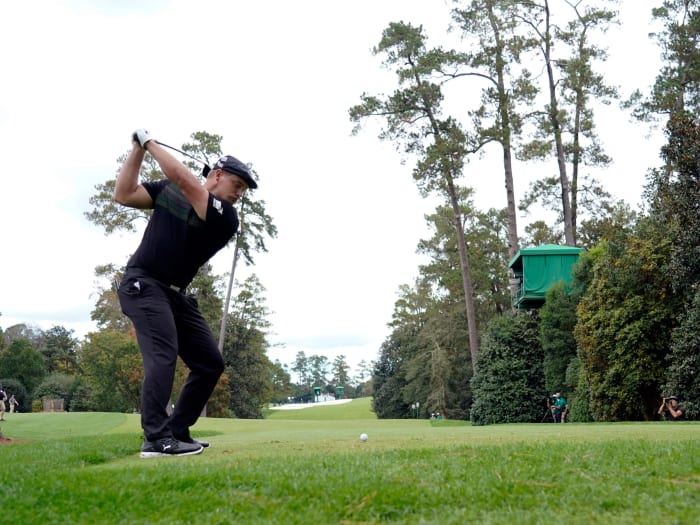AUGUSTA, Ga. — These were just the opening arguments of DeChambeau v. Augusta National, not the rendering of a verdict. DeChambeau played worse than expected, but scored better than he played: a two-under 70 in prime scoring conditions. And to understand why he can win and why he might not, we introduce the first piece of evidence: DeChambeau’s Bridgestone golf ball, which his caddie Tim Tucker found in a bush to the left of the 13th green.
That ball tells the story of DeChambeau at the Masters. It explains why he is a threat to win the green jacket, and also why he could leave here with some lasting scars.
The 13th was the most anticipated hole of DeChambeau’s round: A dogleg left that he figured to devour like a drumstick. He said he hoped to hit a monstrous drive around the bend and possibly all the way to the neighboring 14th hole; there are no trees between Nos. 13 and 14 there, because there was never a need for trees over there. Just as the NBA banned offensive goaltending because Wilt Chamberlain was so good at it, DeChambeau could spur the members here to plant more trees, move tees and pray to new gods that he doesn’t obliterate the course.
On this day, he decided not to try his extra-long 48-inch driver, and he left his drive on the pine straw on the right side of the green, with a thin tree in his way. The ball was above his feet. He had two choices: Lay up, or try to hit a cut (left to right) off a lie that would nudge his ball in the opposite direction.
He did not lay up. That is not his way. “I got greedy,” he said later, which was entirely in character: He is hitting it way past the longest hitters on the PGA Tour and is still desperately trying to hit it longer. So he went for it, and he closed the club-face and yanked the ball into that bush. Well, it happens to the best of them. Rory McIlroy said this week that he has a greater appreciation for the azaleas behind the 13th green because he has spent so much time in them.
What happened next was, somehow, worse. DeChambeau knew he might not find his ball. He knew he had to hit a provisional in case he didn’t. He knew the 13th had gone from eagle opportunity to a survive-and-advance endeavor. Surely he knew he should lay up this time. He dropped a ball, which gave him a mediocre lie, and now he absolutely, unequivocally had to know he should lay up, try to escape with a par and the contents of his wallet … for all the math DeChambeau does on the course, he didn’t have to take this one down to the 12th digit past the decimal point. Just lay up.
He did not lay up.
He hit an awful, low, slicing, creek-seeking missile instead.
“I just completely mis-hit it,” DeChambeau said later. “I was trying to hit a little cut and I over-cut it … I was in not the greatest lie after I dropped it. Probably should have laid up on that one, but you know what, again—I like taking risks.”
Well, taking risks got him here. Taking risks made him the U.S. Open champion and the talk of the golf world. But this was not the time to take risks. This particular risk easily could have ended his tournament. It looked a lot like what DeChambeau did at the Memorial earlier this year, when he lost his composure and quintuple-bogeyed his way out of the tournament.
ROSENBERG: How Bryson DeChambeau Is Breaking the Game of Golf
DeChambeau went to find his first ball. How nervous was he?
“Very, very,” he said, “because I hit my other one in the water and that was not going to be a fun number.”
Tucker found the first one, and DeChambeau took a penalty shot, dropped, had an awkward swing on his pitch, chunked it, chipped on to the green, and two-putted for double-bogey seven. It is extremely difficult to win an event with a seven on one hole—there are just too many great players to beat. But DeChambeau was lucky he only shot seven.
This is the real test for DeChambeau when he tees it up Friday in Round 2, and in every Masters round after that. It’s not whether his style of play can work here. Of course it can. If you are sincerely asking whether it is possible to win the Masters by bombing the ball 350-plus yards, you might as well ask whether it’s possible to eat a lot of cake by taking many huge bites.
Bryson’s way can absolutely work here. But sometimes he is a little too committed to it.
Length is a huge advantage at Augusta National. But poise is at least as important. Like a lot of great players, DeChambeau has a temper on the course; he just has to make sure he releases his anger and does not let it affect his next shot.
DeChambeau was two over par after he left the 13th. He had hit his tee shot on 11 into a tree and punched out farther right than he planned—his shot ended up where grandstands would have been if this were a normal Masters instead of the Special Edition 2020 Dystopian Hellscape Masters. He pitched on to the green and saved par there, but he was clearly not playing anywhere near his best golf. He was, he admitted later, “I guess you could say tight. I wasn’t comfortable with my golf swing.”
Going from two-over through four holes to two-under after 18 was a real achievement. It is a testament to DeChambeau’s ability but also to his grit. Length in golf is like speed in baseball: It never slumps. One of his playing partners, the long-compared-to-nearly-everybody-else Jon Rahm, said DeChambeau hit a few “reality checks.” One came on the par-5 8th, when Rahm crushed his drive, DeChambeau seemed to hit it off the heel, and DeChambeau hit it well past Rahm anyway.
He looked relieved as he walked off the course, and he sounded relieved afterward. A 70 was not a great score on this day; the rain-soaked course was so soft that Xander Schauffele said “it felt wrong.” Balls were sticking where they never stick instead of rolling away. Birdies were available by the bunch.
But a 70 was a great score for DeChambeau on this day. One of Tiger Woods’s many talents is turning a 73 into a 70 and staying in contention. DeChambeau will wake up Friday morning knowing he can still win the Masters. He just has to remember how not to lose it.




